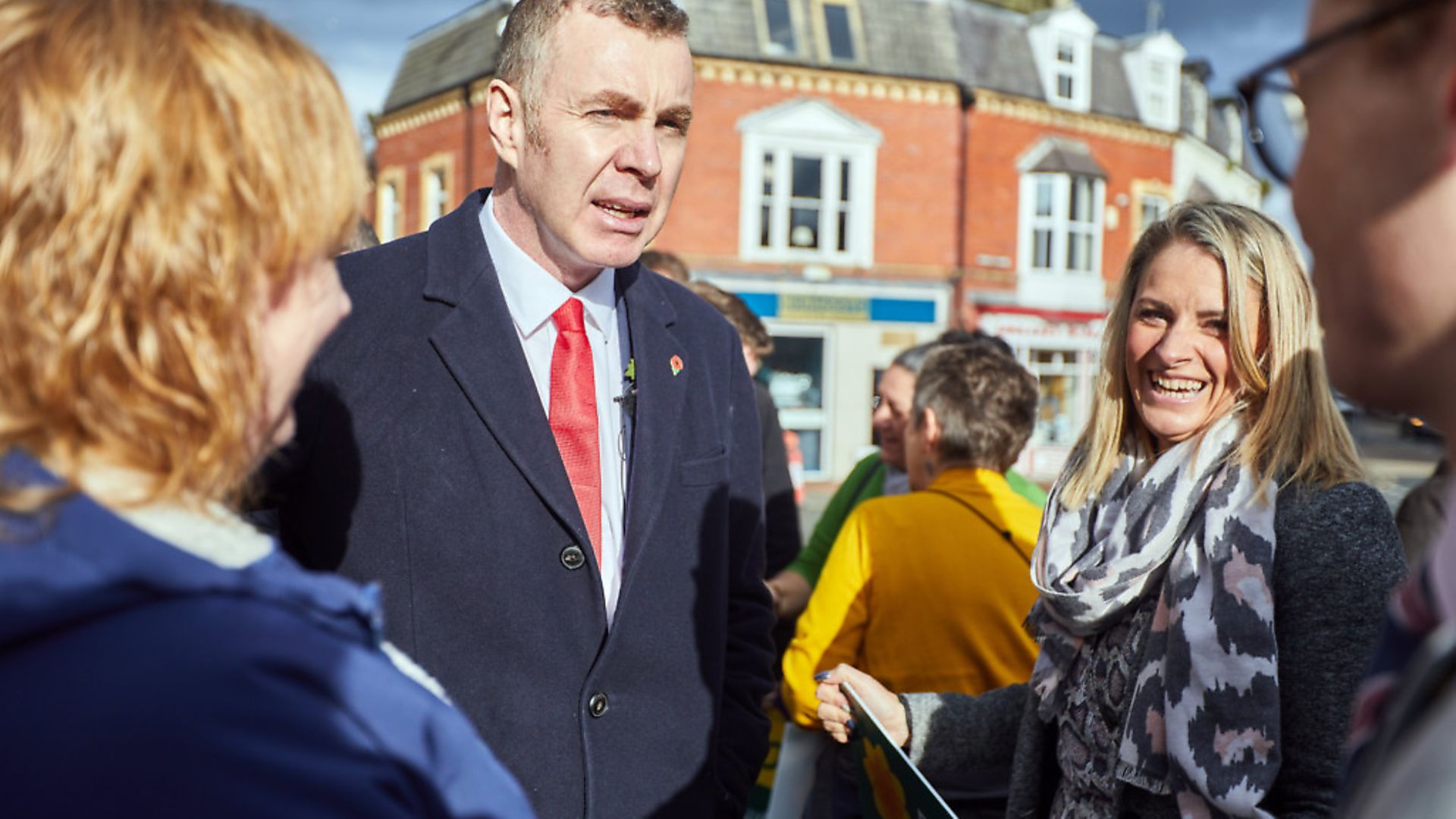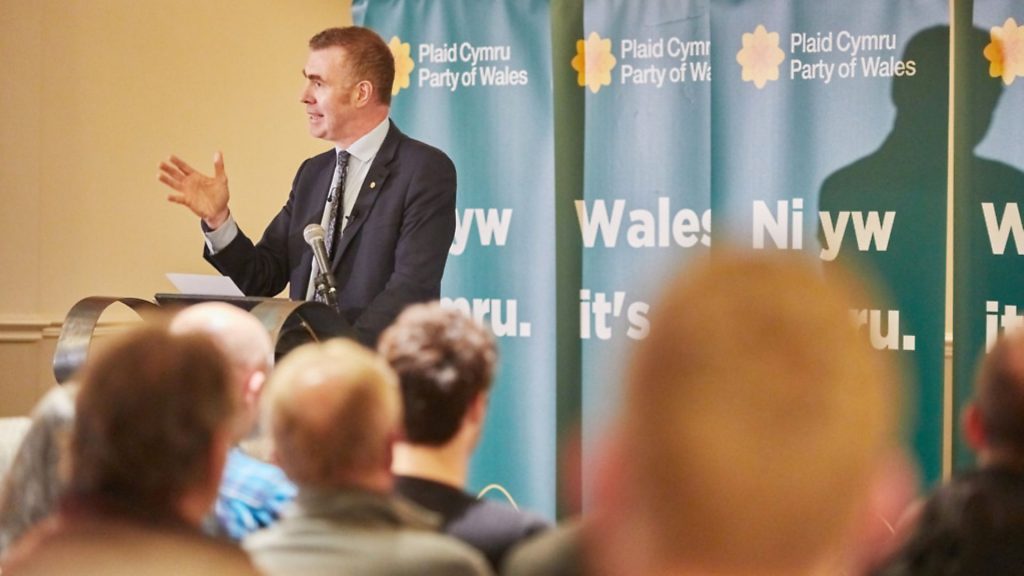
Adam Price, leader of Plaid Cymru, talks to MATT WITHERS about his party’s long march to independence and how recent catalysts mean its aim of a referendum by 2030 is a realistic prospect

It is a sign of the ignorance of devolution in both much of the media and the higher echelons of the UK government that it has taken a global pandemic for people to realise it means different nations not only being able to do their own things but actually doing them. It’s something that Adam Price, the leader of Plaid Cymru, muses on as we speak via Zoom from the Carmarthenshire home where he has been in lockdown for longer than most, his son having shown signs of symptoms in mid-March (all are well).
The 51-year-old hopes to lead his party to victory in next year’s elections to the Senedd and lead a Welsh government which a surprising amount of Conservative commentators appeared largely ignorant of until its approach to lockdown diverged from that of Boris Johnson.
‘Never in the last 21 years, post-devolution, have we ever seen such a high level of awareness of the fact that we have, you know, four different health ministers in the UK,’ says Price, leader of the Welsh nationalist party since 2018.
‘We’re even starting to hear the phrase ‘the English government’ or ‘the English health secretary’. So that really is a huge change.
‘Even within Wales, because we have a weaker media landscape in Wales in terms of home-grown newspapers etc, I think the fact that there’s been daily press conferences by the Welsh government and the fact that there are distinctive policies mean that even in Wales there’s a greater awareness of the significance and the reach of the national government of Wales than we’ve ever had in the last 21 years.
‘I think it’s OK to look for positives even in the most challenging of times. So I think that is certainly one of them.’
Polls have shown people in Wales think the Labour-led Welsh government has handled the crisis better than the Westminster government. Plaid was initially critical of first minister Mark Drakeford’s approach, but have been more supportive since it started to differ from Johnson’s.
‘I think that the early stage of the crisis, the Welsh government tended to follow the similar policy decisions to the Westminster government,’ says Price, whose pre-political career was in business.
‘And I think that during that phase the Westminster government were making a lot of mistakes and the Welsh government, in aligning themselves very, very closely – this sort of four-nation approach that was talked about – were inevitably then making the same mistakes.
‘The more that they’ve been prepared to show their independence of mind, if you like, then the more they’ve been backed by the public in Wales. So when they have shown that kind of independence of mind we’ve backed them and not only have we backed them but they’ve been backed by the Welsh public as well.’
He thinks there is no chance of things returning to normal post-pandemic. The so-called ‘Overton window’ – the breadth of policies acceptable to the mainstream – having shifted. ‘State intervention at a vast scale, but also, I think, an acceptance more generally of a central and positive role for the government in shaping economic policy and industrial policy and the rest of it.’
And yet Wales, to many people’s surprise, voted for Brexit. A country which benefited disproportionately from EU structural funds, and which commentators saw as sharing Scotland’s broad pro-Europeanism, voted to leave by 52.5% to 47.5%. Quick question then, Adam – why?
‘God, yes,’ he sighs. ‘There isn’t a single answer to that and there are probably as many answers to that as there were people who voted to leave the European Union. And I wouldn’t presume to speak on their behalf.
‘But, you know, in that mix of motivations and reasons there has been somewhere, certainly, that feeling of economic and political neglect that many people felt particularly in post-industrial communities like the former coalfield of south Wales but also some of the rural areas as well that have felt a similar sense of political detachment and economic decline.
‘So in that context for many people Brexit will have seemed like a ‘change’ project, and obviously my fear is on the record that that change will end up not being a very positive one for many people in those very same communities.’ He wants a ‘pragmatic and common-sense’ extension to the transition period.
We talk about the state of Welsh politics. As a correspondent based in the Senedd a decade ago I would occasionally rage against the chumminess of it, with four political parties all broadly social democratic (arguably even the Welsh Tories then) and whose members drank together at Cardiff Bay’s Eli Jenkins pub every evening. But friends still there tell me, I say, that it’s now as ugly and rancorous as everywhere else.
Price – an MP from 2001 to 2010 – says: ‘There has been, since that time, a greater ideological divergence, certainly within the Senedd. Obviously [the] Brexit [Party] and what’s left of UKIP are out on their own, really, but there has also been, I think, a shift in the Conservative Party’s politics in the Senedd reflecting developments in the Conservative Party more generally.
‘I think it’s important to have genuine political diversity in any country, I think that’s a good thing. You wouldn’t want a collaborative political culture – which I think is a positive, I think the ability to engage with each other, you know, civilly and have a fruitful dialogue I think is a good thing… but you don’t want that to turn into some kind of soggy centre where there’s no critical challenge whatsoever.
‘So I think it is possible to have both a civil political culture but on the other hand to provide people with real political choices as well.’
Second quickfire question, then: why has the desire for Welsh independence so lagged behind that of Scotland?
‘It’s a great question and the subject of a good PhD thesis,’ says Price.
‘Go to the fact that Scotland, of course, even after its Act of Union of 1707 retained many of the other key institutions of Scottish society. An entirely separate education system, an entirely separate legal system. So many of those trappings of statehood, if you like, continued in Scotland, whereas in Wales the last vestiges that remained in 1536 were got rid of, by and large.
‘Wales is an ancient country but a very new nation, in a political sense. The Welsh state is only 20 years old. The confidence in Welsh political statehood, if you like, is going to be lower and that reflects itself in the support for independence.
‘It’s easier to conceive of an independent Scotland because all these other institutions already exist, whereas in Wales we weren’t starting from scratch but we were starting at a lower level of people’s kind of understanding or belief in our ability to do things for ourselves in a whole variety of different arenas.’
Yet earlier this month a Welsh Barometer poll showed the highest-ever level of support for independence, at 25%. Something is stirring. Price, ironically, thinks Brexit here was a catalyst, that asking people if they want an independent Wales within the EU produces an even bigger score.
Yet anecdotally, and not altogether surprisingly, the handling of the coronavirus crisis has also, in a way, become a national question with, Price says, people looking at the two institutions and despairing of Westminster.
‘It is interesting, at least in social media what people say themselves. You have a lot of people saying ‘I never supported independence before but I am now’, you know?,’ he says. ‘People are on that journey.
‘What you get as well is the classic line from the last few years – they’ll use different words, but people say ‘I’m not a nationalist, I’ve never regarded myself as a nationalist, but…’. And there’s a ‘but’. ‘But I’m now supporting independence’ or ‘I’m indy-curious’ or ‘I’m interested’, you know?
‘There’s almost like a sense of surprise at their own journey, and that shows me that this is deep and this is real. This is beyond ordinary politics in some ways, this is something that people are discussing amongst themselves.’
Wales is now where Scotland was 10 years ago, he says. Plaid’s stated aim is for a referendum by 2030. And these are strange times.
‘I’m in the fortunate position compared to other Plaid Cymru leaders that, actually, independence now is more popular than Plaid Cymru,’ says Price. ‘If you look at it in pure electoral terms then actually, you know, if everyone who supported independence now voted Plaid Cymru then I would become the first minister. That hasn’t been true in the past.’
It says much of Plaid’s journey that a party with its origins in a socially conservative Welsh-language pressure group has the first openly gay male leader of a UK political party and it is barely remarked on (‘Here I am, leader of Plaid Cymru, I’m a gay dad,’ he says. ‘These things are part of the diversity of experience in modern Wales’).
And yet, speaking as we are, amid recent protests against racism, including in Cardiff and Swansea, those self-same roots mean that Plaid has, he admits, ’got to do a lot more’ to reflect modern Wales.
‘It’s something I’m very keen on involving and giving a leadership role for our Plaid Cymru BAME section on, because obviously they can speak far more compellingly from their own experiences as members of the BAME community in Wales.
‘I think that if we as a party want to be the party of Wales then we have to be the party of all of Wales and Wales in all its diversity.’










